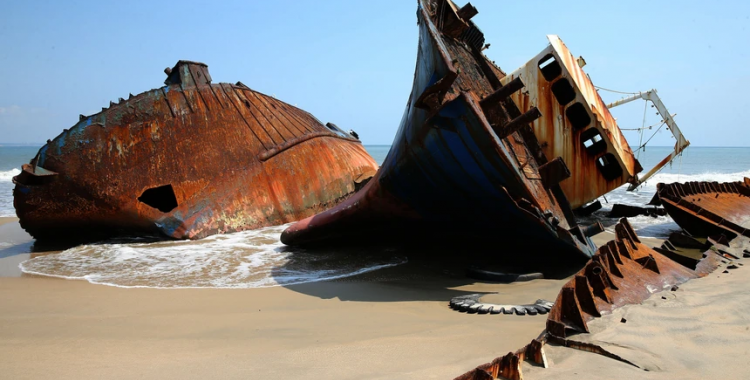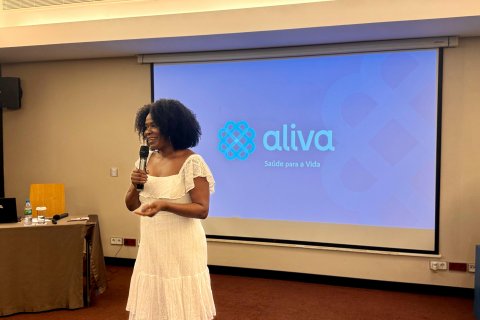But for the fishing community of Sarico, who live with the fallen giants half-submerged in Santiago beach, the scenario is not pleasant because of the negative impact on fishing.
For this reason, many have started to complement this activity with the sale of scrap metal, dismantling the boats' carcasses little by little as a way to increase the meager income.
A situation that seems to have its days counted, after the Government announced, in mid-April, a tender for the cleaning and removal of boats, ships and other maritime devices on the coast of the provinces of Luanda and Bengo.
"This is a catastrophe, it not only harms the sea, but also health," complains José Sebastião dos Santos.
The resident of Sarico says that bathers once frequented the bay, but "stopped coming" because of the pandemic, which led to the banning of the beaches, but also because the sea is "full of waste."
"This harms our children who bathe, the sailors. Also, the boats have come to ruin many nets, we are not being able to work properly, we are not being able to navigate. All the places we used to be able to fish are no longer there, because everything is taken up with ships. It's a serious problem for us," he says.
He knows that some locals are involved in the scrap business, but he says that the main beneficiaries come from outside.
"They are from other neighborhoods, they come to take the scrap metal to make means of survival, now we have difficulties because the fish is difficult and (they are) always throwing ships here. The fishing season is coming, I don't know what will happen to us," José Sebastião is resigned.
The removal of the maritime junk is, therefore, "good news", since it will allow the sea to be recovered for fishing and for fish farms - something that doesn't happen now.
"The fish come and die, they can't stand this waste, the irons, the diesel and die," says the fisherman.
The soba Avelino Gonçalves Mujinga, who introduces himself as "great-grandson of the beach", agrees that the ships are very harmful: "Even on the bottom of the sea we have these boats, our fishing is not like it used to be. Since they started to pull up here, since the 90's, these ships are too much. They ruin our materials and nobody comes to help our community.
The soba says that the Port of Luanda is the entity responsible for the disposal of the abandoned ships in that location and doesn't understand how the "already damaged" ships continue to have an owner, referring to the companies that exploit the scrap metal, some with local partners
"They come to exploit the iron and don't come to help our community. We are tired, we have no water, no light, and no school," he criticizes.
Avelino says that many residents of Sarico have also dedicated themselves to scrap metal "to earn their daily bread", but "they have deprived us".
"They say we can't take the iron out anymore because it's bought. And we, who were born here, don't they give us any support? The sea doesn't give us anything anymore, we take a few irons to get a kilo of rice to support our family, but it is really hard", points out the fisherman, who attributes the lack of fish to pollution and says that the tourists have also disappeared because of the debris on the beach.
José Batista, 19, wanders around the beach, taking advantage of the low tide to collect some scrap metal, an activity he accumulates with his fishing routine.
"We fish, but when the boats stay on the shore we take the opportunity to remove some irons, each year that passes they bring more boats here to Sarico", he tells Lusa.
The young man says that he makes more money with the scrap than with the fish and points out that this activity is also subject to a greater seasonality.
Because of this, he gets together with some friends, in small groups. They climb the hulls of stranded ships and patiently cut out the structures, using only hand tools.
Every piece is worth money, but the work is hard and sometimes accidents happen.
"There are people who leave here really hurt", says José Batista.
He says that no one has ever fallen from the top of a ship, but some carelessness has already caused injuries to those who "are more inclined to take risks.
"Sometimes we take the risk of removing some rusty plates, iron, or pipes. But the halves that are left over remain under the sea, and when people go bathing they can get hurt," he adds, also pointing out the damage caused to the nets as a problem.
They sell the iron by weight to local buyers who transport the materials to Luanda and compete with more organized scrap dealers who "cut it with machines" and use a blowtorch to dismantle the boats.
Ramos Laurindo, 20 years old, dedicates himself mainly to fishing and says that there is a lack of work alternatives for local young people.
For this reason, he also tries to do "a little bit of blacksmithing to get something to eat," because fishing "only happens once in a while. The turnover depends on the days and "the strength".
"There are people who can get two tons, three tons, it depends on our strength," he explains, explaining that all materials are sold at the same price.
In the distance, the metallic noise of the hammer and chisel drowns out the softness of the waves and almost makes one forget the tropical landscape of blue sea and scorching sun. The young people return to work, hoping to earn a few kwanzas to help their families and reach the end of the day without hunger.







